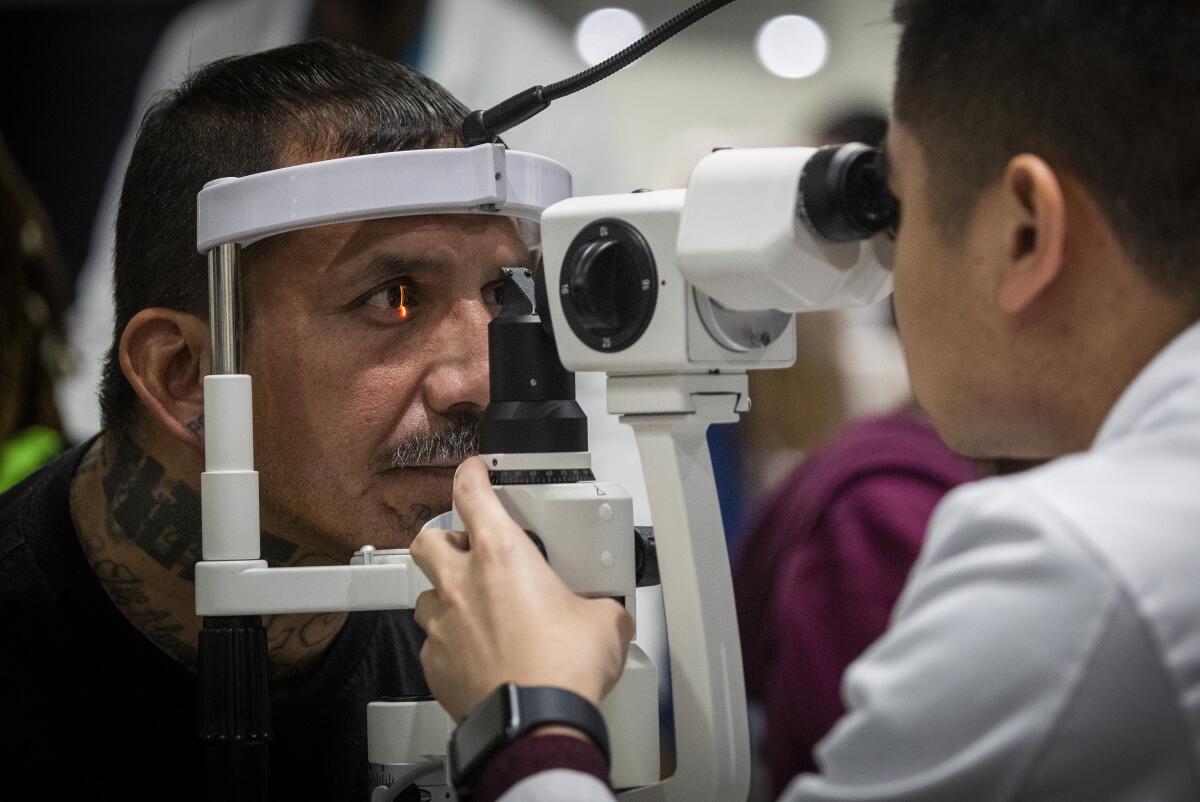Column: Optometrists, ophthalmologists square off over bill to expand role of primary care eye doctors

- Share via
SACRAMENTO — There’s a nonsensical disconnect in California’s efforts to provide universal healthcare. There aren’t enough doctors willing to accept the state’s small fees for treating low-income patients.
So it’s universal healthcare in name only — despite Gov. Gavin Newsom’s repeated boasting about it — because millions of people are denied access to preventative medicine or treatment of their ailments.
Medi-Cal — California’s version of Medicaid for the poor — is an unfulfilled promise in too many cases. A third of Californians, including 40% of the state’s children, are enrolled in Medi-Cal.
But the reimbursement fees paid by the state to doctors are so low that most of them lose money on each patient, they say. Those who do accept Medi-Cal patients make up for the loss by pulling in much higher fees from folks with private insurance.
The Newsom administration has started to negotiate provider contracts that require more patient access. But neither the governor nor the Legislature has been willing to spend the money needed to raise provider fees to an acceptable level, despite a nearly $100-billion budget surplus this year.
OK, that’s the overall big picture.
There’s a little-picture partial solution to the access dilemma on the governor’s desk — one of 680 legislative bills as of Wednesday that Newsom must sign or veto by Sept. 30. This measure, AB 2236, concerns only vision care — but would affect millions of patients.
It pits two quarreling families against each other: primary care eye doctors and eye surgeons. The former are optometrists, the doctors you go to for an annual exam. The latter are ophthalmologists, the surgeons who remove cataracts, for example.
This is a battle over turf. The docs want part of the surgeons’ market share.
The optometrists argue the fight is about providing convenient care in the office and expanding patient access.
Private polling shows Proposition 26 running behind and likely to lose along with another, vastly different sports betting initiative, Proposition 27.
The surgeons, represented by the powerful California Medical Assn., argue it’s about safety — doctors performing procedures for which they’re not adequately trained. Of course, the CMA has made the same argument for years every time optometrists, nurses or anyone else pushes legislation to cut into its territory.
“The CMA says it’s about protection of patients. I think it’s more about protection of a profession,” says Assemblyman Jim Wood (D-Santa Rosa), chairman of the Assembly Health Committee and a dentist.
Wood pushed through a bill two years ago — over the CMA’s objection — that will upgrade the role of nurse practitioners in California.
Kristine Shultz, executive director of the California Optometric Assn., says of the primary care eye docs and surgeons: “They work together in the real world. It’s just in the state Capitol where they start fighting.”
These are called “scope of practice” battles.
The bill, by Assemblyman Evan Low (D-Campbell), would expand the optometrists’ role in vision care. The measure passed the Assembly with no votes to spare, 41 to 11 — with 28 legislators abstaining — after a passionate debate just 10 minutes before the deadline on the final night of the legislative session. There was bipartisan support, but also skittishness.
Under the bill, optometrists could not perform initial cataract surgery. But if the need for follow-up laser surgery developed later — perhaps years — they would be able to perform it.
Two top aides to former California Gov. George Deukmejian remember the Sacramento visit of Queen Elizabeth II and Prince Philip.
They could also do laser surgery for glaucoma. Now they can only treat with eye drops. They could surgically remove skin tags off eyelids. And they could make an incision to squeeze out a stye.
Supervised training on people would be required for state certification.
But not enough training, opponents contend.
“This is eye surgery. It’s easy to say it’s easy. But complications are real. You can, if things go wrong, blind someone,” says Dr. Craig H. Kliger, executive vice president of the California Academy of Eye Physicians and Surgeons and a UCLA assistant professor.
“The amount of training in this bill is not adequate to make someone competent to practice by themselves. It’s not safe for the public.”
That’s disputed by John G. Flanagan, dean of the UC Berkeley School of Optometry and Vision Science.
He says 10 other states allow similar procedures for optometrists “and there have been virtually no complaints or problems.” But patients have better access to care.
In California, optometrists are required to earn a four-year college degree, then attend a four-year optometrist school. The surgeons need a four-year degree, four years of medical school and four years of residency.
The access problem stems primarily from most surgeons refusing to treat Medi-Cal patients, bill supporters say. But most optometrists do.
Also, there’s an acute shortage of surgeons in many rural regions, including the Central Valley. Thirteen counties have no surgeon at all, Flanagan says. Six counties have only one.
“This creates major bottlenecks in care for a population that is 70% people of color,” he asserts.
Kliger counters: “You don’t want to give people access to inferior care. Medi-Cal patients don’t deserve substandard care.”
Wood’s view: “There are two levels of care — people who can get an ophthalmologist and people who can’t.”
Look, I’m just a newspaper hack. This kind of medical stuff is way out of my bailiwick. But Newsom must have experts on his staff who can advise him wisely.
I’m hoping they tell him it’s safe and sensible to allow optometrists to expand their practice and provide more patient access — so the state can start to do what it claims to be doing about universal healthcare.
More to Read
Sign up for Essential California
The most important California stories and recommendations in your inbox every morning.
You may occasionally receive promotional content from the Los Angeles Times.













